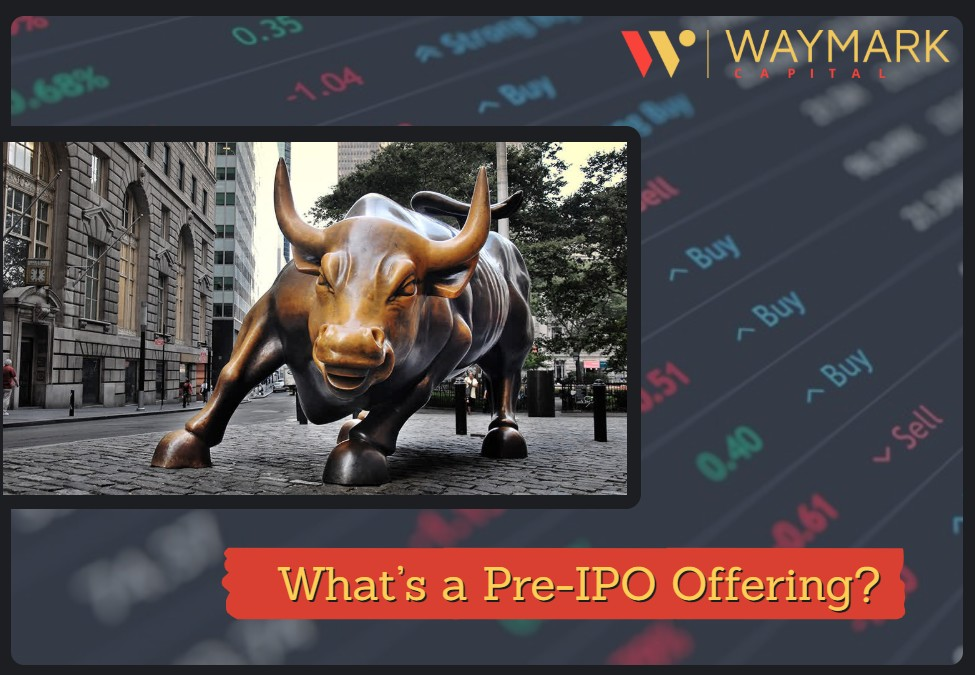
19 January 2022
During a pre IPO offering, a company offers stock shares to investment groups or investors before going public. Often, the pre-IPO company offers such stock transactions to investors who represent big companies at the board of directors, hedge funds, and corporate investors at highly discounted prices.

Once large investors invest in an organization’s pre-IPO, they encourage potential investors to invest in the stock immediately after the organization goes public. Pre-IPO investors reap substantial financial gains if the stock sells at a high price immediately after the IPO.
A pre-IPO offering involves various drawbacks. Often, the risks are high because the organization is under no legal responsibility to go public after the pre-IPO offering. In such a case, the shares would have little or no value if the organization didn’t attract considerable interest to go public.
Such an occurrence would make the pre-IPO stock illiquid, meaning it would be impossible to convert it into cash or even sell it. Usually, a pre-IPO stock comes with a lock-in period during which it cannot sell for a specific time frame once the organization goes public. Should the stock price decline after going public, the pre-initial public offering share price could be more than the market price, causing the investor a substantial net loss.

SEC is tasked with enforcing federal securities regulations. The firm warns potential investors against pre-IPO institution investments. Further, SEC suggests that attracting investors by offering a high ROI on a fictitious, financially unstable, or illegally registered company is against the law.
Previously successful pre-IPO offerings usually offer double and sometimes triple-digit ROI. This type of performance in the securities industry attracts numerous scam characters who promise even better returns.
Whether you opt to invest via a pre-IPO or a normal IPO, the SEC advises investors to do their due diligence and understand the organization in advance. Consider determining whether the securities are regulated by the SEC and how lock-in time frames may restrict the stock. Conduct a comprehensive evaluation of the company and establish the services and products it offers.
Know its core customer base and acquire its financial statements from the department of investor relations. Determine the owners and operators of the company as they will be available with the SEC or regulator within your state if they have a history of defrauding the general public.
Pre-IPO stocks involve numerous risks that buyers should consider before investing. They include:
1. Failure of the Organization to go Public
Investors invest in an institution’s pre-IPO without knowing when or whether they will go public. IPOs can be halted, postponed, or even annulled at the final minute due to various reasons. For instance, Ant Group’s IPO was annulled the final minute following regulatory issues.
2. Reduced Returns
Whether you are an individual investor or are investing through a brokerage firm like Robinhood, a member of FINRA, pre-IPO investing does not guarantee successful performance. If the IPO performs dismally or the company’s stock lacks demand, investors may not receive their expected returns. Assuming the company does not recover from poor performance, its stocks lose value fast, and investors may lose a considerable chunk or even all their investment.
3. Inadequate Financial Information
Pre-IPO investors may not acquire the information they need to make a proper decision. According to the law, publicly traded companies should reveal their financial reports but private companies do not have that obligation. Such a requirement triggers an information imbalance where people investing in private companies lack proper financial reports.
1. Know the Risks Involved
Every investor understands that investment opportunities involve a wide range of risks. Before investing in the stock market or pre-IPO, investors should seek guidance from financial advisors. Experts can help you make an informed decision.
Many traditional investors prefer investing in companies and startups that have been public for a long time because they can access comprehensive reports on their growth curve. Further, their general success curve is available in stock market reports and charts.
As mentioned before, private boards and institutions are not obligated to publicly reveal specific data due to their ownership structure. As a result, the information investors collect about their performance can be limited. Again, there is an imminent risk of the startup failing. When you invest in startup pre-IPO, you should embrace both profits and losses.

Investors can easily lose their investment in startup pre-IPO due to an unpredictable environment. However, many companies already understand the risk, which is why they often offer shares at reduced prices to attract early-stage funding and angel investment.
2. Do Your Calculations to Determine the Result’s Accuracy
Before investing in a startup’s pre-IPO, you need proper knowledge of the investment procedure and the institution’s expected valuation. Startup pre-IPO often reveals its estimated revenue growth. Every investor should be vigilant to avoid unexpected losses.
3. Analyze the Legal Documents
Acquiring and evaluating a startup’s pre-IPO documents is more than understanding the risks. Ensure the startup you invest in has all the relevant documents. For example, NASDAQ or New York Stock securities and exchange commissions by pre-IPO startups should be exempt or registered under the regulator’s rules in your state.
SEC filings and documents like the form 10-K and the prospectus should include detailed information on the startup’s history, financial position, and standard operations based on audits from legal and authorized accounting professionals.
Choosing the right startup pre-IPO is critical to preventing losses. Use these tips to be on the safe side.
1. Consult
Accounting institutions and investment banks usually have a database of private companies seeking accredited investors. Collaborate with your investment adviser or stockbroker to determine authentic pre-IPO startups you can invest in. Investors without prior experience can collaborate with investment brokers and advisory institutions that major in pre-IPO placements.
2. Develop a Robust Business Network
Smart and robust business connections are critical when investing in a startup’s pre-IPO. Such a network can hook you up with investment banks and leaders in the industry. Consider joining startup accelerators and incubators if you want to invest your money in high-potential organizations. Well-established startup schemes from popular firms have made success possible for some of the established names in the industry, like Airbnb, Amazon, and Dropbox.
3. Attend Startup Pitch Contests
Entrepreneurs can leverage pitching events to introduce their startups to industry leaders and accomplished investors. Doing so increases their chances of acquiring the funding they require to scale. Startup pitching competitions allow investors to understand and increase their knowledge of their preferred investment startup. Further, they understand their preferred investment startup’s audience and may consider connecting with upcoming entrepreneurs and coaching them. Doing so increases the startup’s opportunity for success.
4. Utilize a Stock Tokenization Program
Stock tokenization is the process of discharging security blockchain tokens equivalent to the number of shares you bought from a startup’s pre-IPO. Investors can then trade the digital tokens, just as would be the case with the stock market.
Distributed ledger, cryptocurrency platforms, and private business shareholders can change tokens into cash and ease stock liquidity through stock tokenization. Further, investors can purchase and hold asset tokens easily because stock tokenization leverages a peer-to-peer trading approach.
To retain private equity, investors should collaborate with renowned wealth managers who are experienced in managing shares and assets of already established and legitimate organizations.
5. Join an Incorporated Angel List
An incorporated angel list is an efficient funding channel where investors meet compatible angels and generate the capital a startup pre-IPO needs to grow. Unlike VC (venture capitalist) organizations which spend colossal amounts to increase their ROI, angel groups and incorporations usually close their investments at thousands, making them a practical option for the startup industry.
You stop being an individual investor by joining an incorporated angel list, meaning you need lesser paperwork. Up to 99 investors can invest in startup firms as a single group, reducing the number of forms and applications required for processing. Further, joining incorporated angel groups enables investors to develop a business network of pre-IPO startups.
Developing robust relationships with startup founders exposes you to other organizations to be an angel investor. Again, these startup patrons can introduce you to other relevant startup pre-IPOs you may be interested in. In the process, you may end up discovering startups with high growth potential.
6. Start Small
After identifying your preferred startup pre-IPO, take your time before investing a considerable sum of money. Consider investing a small volume initially and monitor its performance. If you succeed, you can increase your investment amount in the startup. Assuming things do not go according to plan, you will incur a minimal loss.
Not all startup pre-IPOs are worth investing in. However, investing in the ideal pre-IPO can be an excellent way of developing lifelong wealth. By investing in the ideal company at the appropriate time, you can gain a considerable return on investment. Remember, pre-IPO investing faces numerous risks, just like other investment venture, but with proper planning the advantages outweigh the risks. Take time to determine the right IPO and work with professionals to reduce your risk.
Image Credit: